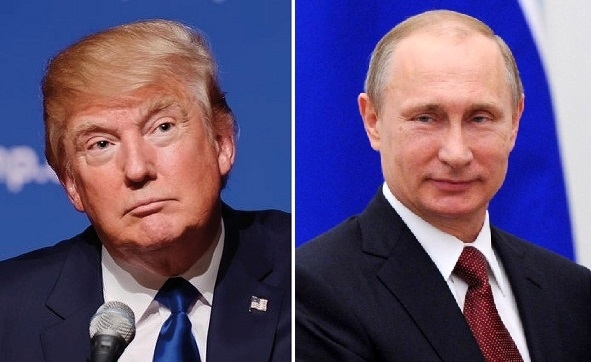Local News
No signs probes into Russia, Trump campaign will die down

President has dismissed stories as “fake news.”
WASHINGTON — An FBI investigation and congressional probes into the Trump campaign and contacts with Russia continue to shadow the administration, each new development a focus of White House press briefings and attention on Capitol Hill.
President Donald Trump has dismissed the story as “fake news” and raised allegations of politically inspired spying by the Obama administration, but the investigations show no sign of abating anytime soon.
Here are the latest developments and background on the scandal:
—
THE LATEST
A Senate Judiciary subcommittee says it will hear testimony in May from former acting attorney general Sally Yates, who was fired in the early days of the Trump administration, and James Clapper, the former director of national intelligence under President Barack Obama. The May 8 open hearing will be the first opportunity for the public to hear Yates’ account of her role in the firing of Trump’s first national security adviser, Michael Flynn.
Separately, leaders of the House Committee on Oversight and Government Reform say Flynn appeared to violate U.S. criminal law when he failed to seek permission for or inform the government about accepting tens of thousands of dollars from Russian organizations after a trip there in 2015. Flynn’s lawyer said in a statement that Flynn disclosed the trip in conversations with the Defense Intelligence Agency, where he was its former director.
—
THE BACKGROUND
Hackers broke into the computer network of the Democratic National Committee during the 2016 campaign, which U.S. officials and cybersecurity experts have publicly tied to Russian intelligence services. Stolen emails to and from top Democratic Party officials, including then-DNC chairwoman Debbie Wasserman Schultz, were released to the public last summer on the secret-sharing website WikiLeaks, followed in the fall by the hacked messages of John Podesta, the campaign chairman of Democratic presidential candidate Hillary Clinton.
U.S. intelligence agencies have been blunt in their assessment that the hacks of Democratic email accounts were intended to benefit Trump and harm Clinton, his Democratic opponent.
—
THE INVESTIGATIONS
FBI Director James Comey told Congress in March that a federal investigation examining Russian interference in the presidential election, and potential coordination between Russia and the Trump campaign, began in late July. The counterintelligence investigations like this one that examine the operations of foreign intelligence services on U.S. soil are heavily classified, historically time-consuming and rarely result in criminal charges. It’s not clear when this one will end or whether anything criminal will be found, though Comey has said the investigation is being done with an eye on whether any laws were broken.
The House and Senate intelligence committees are conducting their own, simultaneous investigations. Republicans in Congress also are concerned that classified material about Trump associates recorded having conversations with Russian officials was improperly leaked to the news media and that the information had been improperly disseminated throughout government agencies.
The House probe has been riven with discord. Devin Nunes, the top Republican on the committee who reported meeting with a secret source at the White House to review classified material that he said indicated that communications of Trump associates were captured in “incidental” surveillance of foreigners, recused himself in April from the investigation.
—
THE PLAYERS
Numerous figures in the Trump orbit have come under scrutiny for communications with Russians, though each has denied doing anything improper – and no one has been charged with any crime.
Flynn was interviewed by the FBI in the early days of the Trump administration about communications he had with the Russian ambassador, Sergey Kislyak, during the transition period. The White House fired him in February after concluding that he had not been truthful about those conversations.
Republican strategist Roger Stone has said he communicated with Guccifer 2.0, the unnamed hacker that has taken credit for breaking into the DNC servers. But Stone has denied that he worked with Russian officials to influence the presidential election.
Carter Page, a foreign policy adviser to the Trump campaign, met with a Russian intelligence operative in 2013 and provided him documents about the energy industry, according to court documents from a 2015 prosecution alleging a Cold War-style spy ring in New York. Page, referred to in the filing as “Male-1,” is not accused of wrongdoing and said in a statement that he shared “basic immaterial information and publicly available research documents.”
Meanwhile, Justice Department officials have scrutinized the business dealings of Paul Manafort, who resigned in August as Trump’s campaign chairman. The Associated Press has reported that Manafort worked for Russian billionaire Oleg Deripaska in 2005 and proposed an ambitious plan to promote the interests of “the Putin government” and undermine anti-Russian opposition across former Soviet republics.
—
THE RESPONSE
Trump has sought to dismiss the story as “fake” and has countered with his own allegations of politically motivated spying by the Obama administration. The White House has also tried to publicly minimize the contributions either to the campaign or administration of some of the individuals whose names have surfaced as part of the investigation, such as Manafort and Flynn.
Trump took to Twitter in March to accuse President Barack Obama of having wiretapped him at his New York skyscraper during the campaign. Law enforcement, congressional and intelligence officials have called that allegation untrue.
In an interview with MSNBC, Susan Rice, Obama’s national security adviser, acknowledged that she had sometimes asked for the names of Americans who were referenced in intelligence reports, but denied that she or anyone else in the administration had used those reports for political intelligence purposes. Trump said the following day that he believed Rice had committed a crime.

